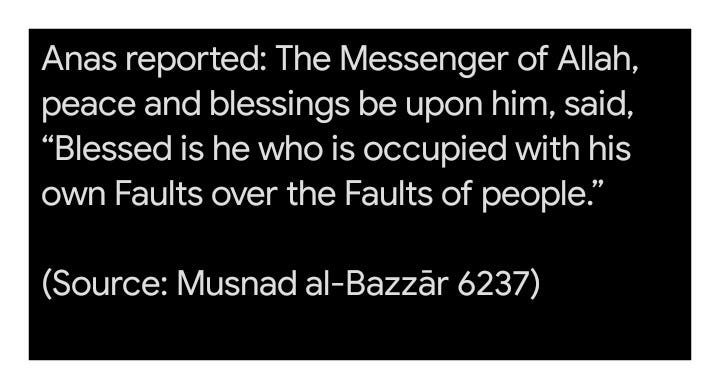Embracing Self-Reflection: The Path to Inner Peace and Harmony
Written on
Chapter 1: The Importance of Concealing Others' Faults
The Prophet Muhammad (saw) stated that anyone who hides the faults of their Muslim brother will have their own faults concealed by Allah on the Day of Judgment. Conversely, those who expose the shortcomings of others will find their own faults revealed, even those committed within the privacy of their homes (Ibn Majah, no. 2546; al-Albani affirmed its authenticity in “Sunan Ibn Majah,” no. 2063).
It has been narrated that some of the early scholars remarked on this principle: they observed individuals who, despite being free from shameful faults, spoke of the flaws of others, leading to their own faults being exposed. In contrast, they noted those who had faults but chose to conceal the shortcomings of others, causing their own faults to be overlooked.
Nothing brings more relief and happiness to the heart than maintaining a positive view of others. This mindset shields one from troubling thoughts that disrupt peace and drain energy.
Section 1.1: Avoiding Judgment of Intentions
One of the most effective ways to foster goodwill towards others is to refrain from judging their intentions. Only Allah, the Almighty, possesses complete knowledge of our hearts and intentions. He has not commanded us to scrutinize one another’s inner thoughts, and it is imperative that we avoid harboring negative assumptions about others.
Individuals who embody the virtues of Islam, showing kindness and engaging with others sincerely for the sake of Allah, will reap rewards on two fronts: for developing commendable traits and for their efforts to connect with others to guide them toward Allah without ulterior motives or a desire for worldly gain.
Subsection 1.1.1: The Pillar of Self-Examination

A fundamental aspect of nurturing one’s spirit is the capacity for self-examination, which involves recognizing personal flaws and ethical weaknesses. Engaging in self-reflection allows an individual to eliminate the roots of destructive traits that have developed over time.
Scholars emphasize the critical nature of self-awareness, asserting that anyone wishing to rid themselves of spiritual impurities must not only reflect on these issues sporadically but should engage in daily contemplation. It is recommended that individuals set aside quiet time to review their daily actions, documenting both commendable and unworthy deeds. Upon identifying faults, they should resolve to avoid repeating those actions.
Hazrat Ali ibn Abi Talib (r.z) advised that it is essential for an intelligent person to examine their weaknesses in matters of faith, behavior, and interactions with others. They should either internalize these reflections or record them, striving to eliminate undesirable traits.
Section 1.2: The Dangers of Criticism
However, some individuals continuously seek to uncover the faults of others, lacking insight into their own shortcomings and remaining oblivious to the spiritual states of those around them. These individuals often find pleasure in pointing out the flaws of others, as this serves to mask their own feelings of inadequacy.
It is crucial for us to contemplate the immorality of such behavior. Criticizing others can erode the bonds of friendship and trust, potentially leading to animosity. In contrast, acknowledging and praising the good deeds of others strengthens the ties of friendship.
If those who focus on the faults of others redirected their energy towards self-improvement and self-recognition, they would attain a much higher level of contentment.
Chapter 2: The Path to Personal Reform
The video titled "Encouragement & Prayer: Whom God has blessed, no man can curse (8-31-24)" offers insights into the importance of self-reflection and the blessings of maintaining a positive outlook toward others.
The fundamental flaw of those who constantly seek to highlight the faults in others is their inability to coexist within a community; they expose the secrets of others, leaving no one safe in their presence. Hazrat Ali ibn Abi Talib (r.z) cautioned against associating with individuals who critique others, as no one is truly safe from their scrutiny.
Thus, we must prioritize self-assessment and strive for personal reform in alignment with the teachings of the Qur'an and Sunnah. By embodying positive attributes and actions, we inspire others to reflect and pursue their own path of self-improvement.
When individuals grasp the distinction between truth and falsehood, as well as the purpose of life, they will be equipped to reflect on their own actions.
May Allah (swt) count us among His obedient servants. (Ameen).
JazakAllah (May Allah Reward You with Goodness) for reading. Please follow and subscribe for more insightful stories delivered to your inbox.